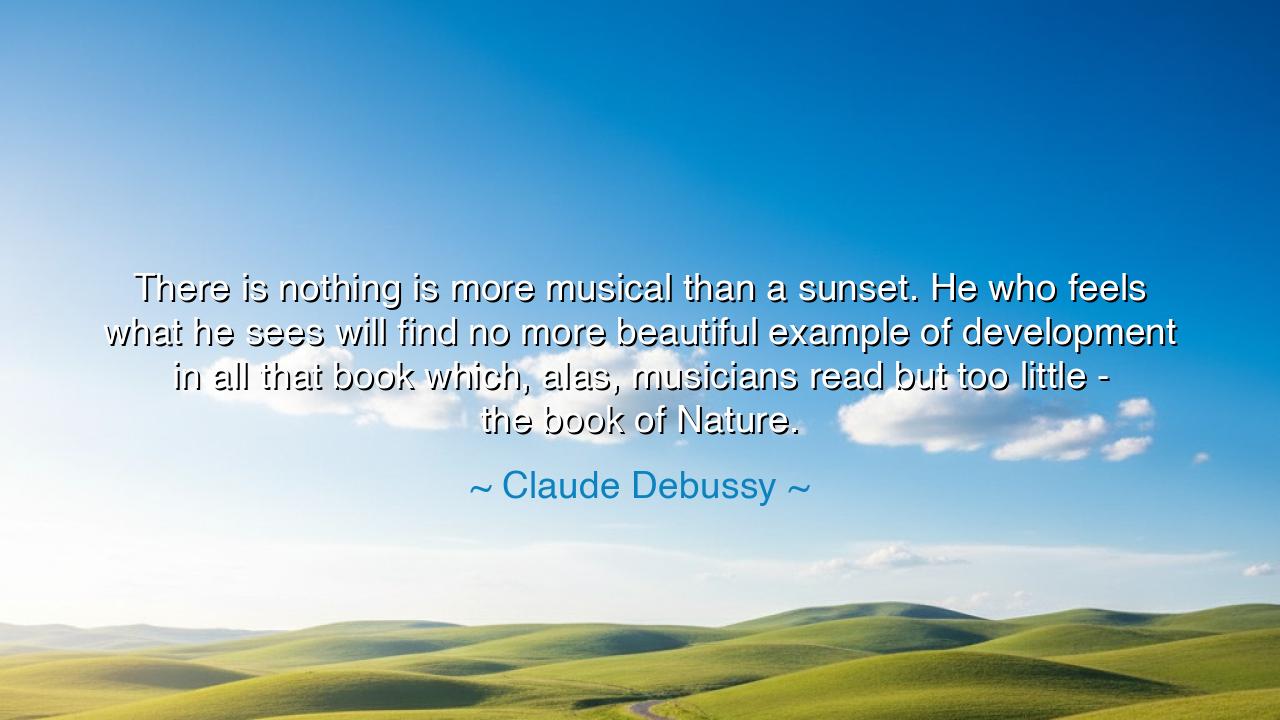
There is nothing is more musical than a sunset. He who feels
There is nothing is more musical than a sunset. He who feels what he sees will find no more beautiful example of development in all that book which, alas, musicians read but too little - the book of Nature.






Hear the words of Claude Debussy, poet of sound and master of impression, who once declared: “There is nothing more musical than a sunset. He who feels what he sees will find no more beautiful example of development in all that book which, alas, musicians read but too little — the book of Nature.” In these words, he reminds us that music is not born merely from scales, notes, and theory, but from the eternal rhythms of the world itself. The sunset, with its gradual fading of light, its swelling hues, its silent crescendo and diminuendo, is a symphony greater than any man may compose, written not upon parchment but upon the heavens.
The sunset is music without sound, a harmony of light and color that moves the heart as deeply as the most profound sonata. To watch it is to witness development, the unfolding of themes and variations — gold deepening into crimson, crimson softening into violet, violet surrendering to the darkness of night. This is not chaos, but order concealed in mystery. Debussy teaches that the artist must not only study the laws of his art but also open his soul to the book of Nature, for in it lie the true lessons of beauty and form.
Consider the life of Beethoven, who, though struck deaf, continued to compose music of immortal depth. How could he, who could no longer hear the notes, still write symphonies that shook the world? Because he listened not merely with ears but with the spirit, attuned to the eternal music of wind and sky, of storm and stillness. He read the book of Nature with his heart, and from it wrote works that transcend sound, reaching into the very soul of mankind.
Debussy’s words also rebuke us. He laments that musicians, too often, read too little of this book. They bury themselves in technique and theory, mastering finger and form but forgetting that true art is born of listening — not only to instruments but to life itself. The sunset, the river’s flow, the call of a bird at dawn, these are teachers no conservatory can replace. The musician who ignores them may achieve skill, but not depth; precision, but not poetry.
The meaning stretches beyond music. For all who live, whether they wield brush or hammer, quill or plough, the book of Nature lies open before them. To see it with feeling is to learn patience, rhythm, and harmony. The tree teaches growth, the sea teaches persistence, the mountain teaches strength, and the sunset teaches surrender. The one who feels what he sees discovers that the world itself is a great symphony in which every soul is a note.
The lesson, O seekers, is that true wisdom and beauty cannot be found in human rules alone, but in attunement to the eternal rhythms that surround us. Do not live as one blind to the sunset, deaf to the river, untouched by the wind. Train your heart as much as your hands. Learn not only to calculate but to feel. For in the silence of evening, when the light slowly fades, you will hear the music that underlies all things — if only you are willing to listen.
Therefore, take these practical actions: Step outside each day and read a page of the book of Nature. Watch a sunrise or sunset without distraction, and let its slow unfolding teach you rhythm and patience. Listen to the wind or the rain, and hear in them the melodies that guide true creation. If you are an artist, let Nature be your mentor; if you are not, still let it guide your soul toward balance and peace. And above all, cultivate the ability to feel what you see — for in that lies the secret of all artistry and all wisdom.
So remember Debussy’s words: there is nothing more musical than a sunset. In its light, its colors, its quiet song, lies the eternal lesson of creation. Read the book of Nature, for it is the oldest and greatest text, and those who learn from it shall not only create but live in harmony with the music of the universe itself.






AAdministratorAdministrator
Welcome, honored guests. Please leave a comment, we will respond soon